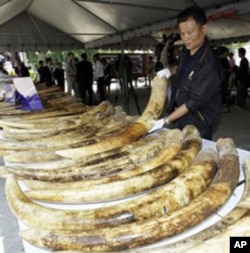The pact was signed by both governments in early August. It stipulates that the Central African neighbors will jointly manage over 300,000 hectares of protected area. They will be patrolled by an increased number rangers, who will also be better armed.
The decision follows continuing warnings by conservationists that Central Africa risks losing all of its elephants to poaching.
The wildlife trade monitoring network, TRAFFIC, says most of the ivory is destined for Asia, where demand – and prices – are high. Ivory is used in making piano keys, billiard balls, jewelry, electrical appliances, furniture and decorative items.
Cross-border game reserves include the 70,000 hectare Sena Oura park in Chad. It was home to about five thousand elephants five years ago. But the number has nearly dropped by half. The World Wide Fund for Nature says the situation is even worse in Cameroon’s Bouba Ndjidda park, where fewer than 300 elephants remain.
Cameroon’s Minister of Forestry and Wildlife, Elvis Ngolle Ngolle, signed the pact on behalf of the government. He says the partnership is vital considering that various preventive measures have failed to deter poachers.
"The government of the Republic of Chad and that of Cameroon are committed to conservation and to the sustainable management of our ecosystems," said Ngolle. "One manifestation of that commitment is to agree in a formal manner to jointly manage not only our parks and protected areas, but also to jointly fight against the phenomenon of poaching. We discussed other issues which will enrich this collective commitment; issues such as the training of our eco-guards."
A Cameroon government conservation partner, The Last Great Apes Organization, says organized wildlife crime syndicates killed an estimated 23,000 African elephants in 2006. The World Wide Fund for Nature notes that half of that number exists today in Cameroon, once a haven for elephants in the Congo Basin.
Martin Tchamba, head of the fund’s elephant conservation programs in Cameroon, says threats of extinction are even more tangible in the country’s southeast. That’s where hundreds of laid-off logging company workers have switched to poaching.
"It’s true," said Tchamba, "that deforestation is also a factor contributing to dwindling elephant populations. But the main reason is poaching and lately, we’ve noticed a clear link with the global financial crisis. Several logging companies shut down and many workers – about a thousand people – lost their jobs and are now into poaching. At least ten elephants are killed every month in southeast Cameroon and that’s very disturbing. In ten years, at this rate, the entire elephant population there will be wiped ou."
The country’s wildlife laws protect elephants and threaten poachers with up to ten years in jail and up to US$20,000 in fines. But conservationists suspect corrupt government officials and businessmen of running the powerful poaching networks, some extending as far as West Africa and Asia. They also say the wide circulation of weapons in the region make it easy to get arms that can easily overpower poorly-equipped rangers.
Minister Ngolle Ngolle says several times, logging companies have been caught with elephant tusks neatly tucked away in timber trucks.
"We’ve been able to identify and seize from forestry operators some wildlife species which are not supposed to be in their possession and some of them have been sent to court," he said.
Conservationists says the Cameroon-Chad partnership is a model for other countries in Central Africa. They say better equipping rangers and increasing joint cross-border patrols could make the region a safe haven for elephants once again.




